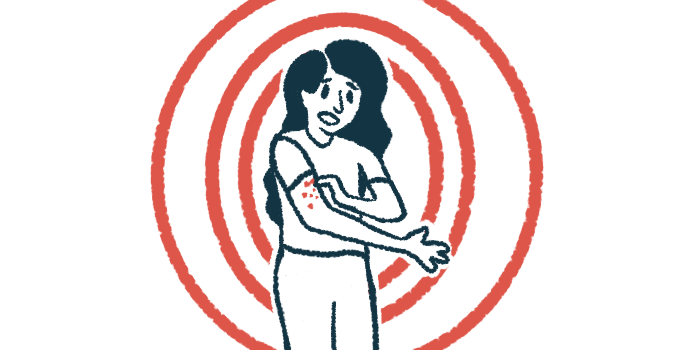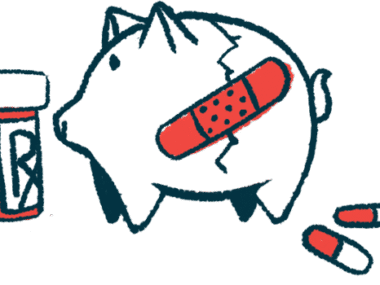Linerixibat eases ‘relentless’ PBC itching in Phase 3 trial, meeting goal
New GLISTEN data show treatment led to significant reductions in itch
Written by |

Treatment with linerixibat, an oral medication in development by GlaxoSmithKline (GSK), led to significant reductions in pruritus, or itching, among adults with primary biliary cholangitis (PBC) in a Phase 3 clinical trial, meeting the study’s main goal.
That’s according to new data from GSK, which indicated that additional analyses from the Phase 3 GLISTEN trial (NCT04950127) are ongoing. Full data will be reported at a future scientific meeting, the company said.
“Linerixibat has the potential to be the first global therapy specifically developed to treat itch in PBC,” Kaivan Khavandi, MD, PhD, senior vice president and global head, respiratory/immunology R&D at GSK, said in a company press release. The company predicted that, “by 2030, … more than 240,000 people [with PBC worldwide] will experience relentless itch requiring treatment.”
According to Khavandi, these new “positive data suggest that [linerixibat] could have a place in supporting patients whose quality of life is significantly affected in multiple ways by persistent itching.”
A small number of trial participants are still being followed in an exploratory phase of the study, GSK noted.
Itching is among most common PBC symptoms, affects life quality
PBC is a rare autoimmune liver disease characterized by chronic cholangitis, or inflammation in the ducts that carry the digestive fluid bile from the liver to the intestines.
This inflammation can ultimately cause bile flow to be stalled, a condition known as cholestasis. As a consequence of cholestasis, bile accumulates in the liver and damages it, allowing bile acids to leak into the bloodstream. This is thought to drive the persistent itching that is one of the condition’s most common symptoms.
Such itching, medically known as pruritus, can have a significant impact on patients’ life quality, including causing sleep problems and fatigue.
“The itch associated with PBC for many patients is unrelenting and often severe but is a symptom that is frequently overlooked or dismissed,” said Carol Roberts, president of The PBCers Organization, a patient advocacy group.
Roberts noted that itch “has a significant impact on quality of life and mental health for people with PBC,” and said that “the potential of a treatment option that addresses a root cause of itch answers a previously unmet need for people with PBC.”
Available treatment options for PBC-related itch are limited, and some are poorly tolerated, according to GSK. These therapies either work by improving bile flow through the liver or by targeting proteins involved in bile acid generation, inflammation, and scarring.
The itch associated with PBC for many patients is unrelenting and often severe but is a symptom that is frequently overlooked or dismissed. … The potential of a treatment option that addresses a root cause of itch answers a previously unmet need for people with PBC.
Linerixibat is an orally available molecule that works by blocking the ileal bile acid transporter, or IBAT, a protein that normally recycles bile acids from the intestines back to the liver. By suppressing IBAT, linerixibat promotes bile acid excretion through the stool, ultimately preventing their buildup in the liver and blood, and easing itching.
The investigational therapy has been granted orphan drug status in the U.S. and the European Union for PBC and associated pruritus, according to a separate company press release. Orphan drug designation, granted to therapies for rare diseases, offers regulatory support and financial incentives to help accelerate a treatment’s development.
Findings from a placebo-controlled Phase 2b trial called GLIMMER (NCT02966834) indicated that daily treatment with linerixibat could ease pruritus and improve life quality among adults with moderate to severe PBC-related itching.
GLISTEN trial allowed remote participation by PBC patients
The ongoing Phase 3 GLISTEN study was designed to evaluate the safety and efficacy of linerixibat against a placebo, at a dose of 40 mg twice a day. The trial enrolled 238 adults, ages 18-80, with PBC and moderate or severe pruritus.
Participants were randomly assigned to receive either linerixibat or the placebo, with some participants crossing over to the alternate treatment arm at some point in the study. During the trial, patients were allowed to continue on a stable regimen of recommended anti-itch therapies.
The study’s main goal was to evaluate change in patients’ self-reported monthly itch severity after about six months of treatment.
GSK now has reported that linerixibat was associated with a significant reduction in monthly itch scores relative to the placebo over the six-month period, meaning the trial met its main goal. Preliminary safety results were consistent with previous studies of the investigational therapy, according to the company.
To facilitate enrollment and participation in GLISTEN, GSK partnered with Science 37, a company focused on accelerating clinical research by expanding access to trials by U.S. patients.
Through Science 37’s direct-to-participant site, patients in the U.S. who don’t live near participating clinical sites can still enroll and perform trial activities remotely. This helped nearly double U.S. enrollment in the trial.
“The enhanced access of a decentralized approach becomes invaluable when sponsors are dealing with small patient populations that are widely dispersed across countries or even continents,” Debra Weinstein, MD, vice president of internal medicine and principal investigator at Science 37, said in a company press release.
Brandon Maggio, global head of digital operations and process optimization at GSK, noted that the partnering with Science 37 ways key in making the trial more accessible.
“Science 37’s innovative services meant we could bring the trial to the homes or neighborhoods of patients in rural areas who would typically have to travel hundreds of miles to the nearest clinical site, which may otherwise have been a barrier to participating,” Maggio said.
GSK noted that PBC patients who complete previous linerixibat trials have the option to continue treatment in an open-label Phase 3 study (NCT04167358) that will evaluate the therapy’s long-term safety and tolerability.




